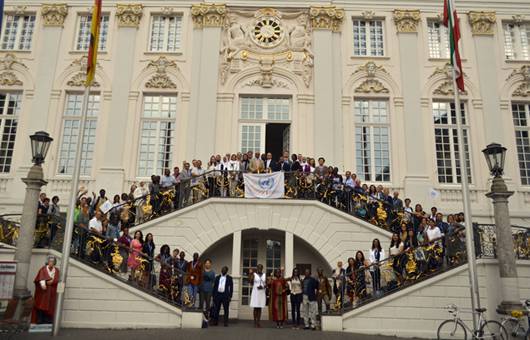Highlights from the UN Summer Academy 2019
During the last week of August, the United Nations Summer Academy took place for the fourth time in Bonn. Organised by the United Nations System Staff College (UNSSC), the Academy offered five intense days of learning and knowledge-building around the 2030 Agenda and the Sustainable Development Goals (SDGs). This year’s theme, ‘The 2030 Agenda: Taking Stock and Looking Ahead’, focused on reviewing the current progress in implementing the 2030 Agenda, discussing opportunities to accelerate it, as well as proposing ways to tackle persisting challenges. Particularly relevant in the context of the first high-level SDG Summit at the UN Headquarters in September, the discussions not only contributed to a deeper understanding of issues around the agenda but also proposed concrete actions and pathways to achieve sustainable transformations.
The UN Summer Academy gathered a multitude of different actors from the realm of sustainable development. Drawing on the diverse experience of representatives of international organisations, different national and regional governments, civil society organisations, research institutes, as well as private companies, the Academy served as a platform for different stakeholders to meet and to provide a space to discuss issues from multiple perspectives.
The recurrent theme was the joint search for pathways and strategic entry points to realise the necessary structural transformations that involve all stakeholders and achieve synergies between the SDGs. Different speakers throughout the week accentuated the need to discard the often enduring ‘silo-thinking’, and to instead embrace integrated and holistic approaches towards the SDGs.
Opening the Summer Academy with a keynote address, Ibrahim Thiaw, Under-Secretary-General and Executive Secretary of the UN Convention to Combat Desertification (UNCCD), discussed the topic of sustainable land management and its interconnections with all SDGs. Another keynote speaker, Moira Faul, Deputy Director of the Public-Private Partnership Center at the Geneva School of Economics and Management, addressed the complex, at times tense relationship between policy coherence on the one hand and policy space on the other hand
After a week of engaging discussions, different strands were drawn together during Friday’s panel discussion on how to catalyse resources for the achievement of the 2030 Agenda. Speakers from the private sector highlighted the important role of private finance and leveraging the innovative capacity of the private sector.
Beyond high-level expert panels, the unique format of the UN Summer Academy allowed participants to heavily draw on their own experiences in working towards sustainable transformations, to share inspiration, ideas and best practices, as well as to form new partnerships.
With the key support of the state of North-Rhine Westphalia (NRW) and the Energy Agency NRW, the UN Summer Academy also offered three site visits in the region. These exposed participants to prominent examples of sustainable projects and successful structural transformations in the area of sustainable energy, energy efficiency, and climate protection. All of them brought concrete strategies to the fore that actively contribute to achieving the 2030 Agenda, equipping participants with practical knowledge of successful and potentially transferable sustainable development practices.
The week of intense learning and knowledge building was complemented by a series of social activities that provided ample opportunities to network and connect with actors from different countries and sectors. Particular highlights included a boat ride on the Rhine in the evening and a reception at the Old Townhall of Bonn.
